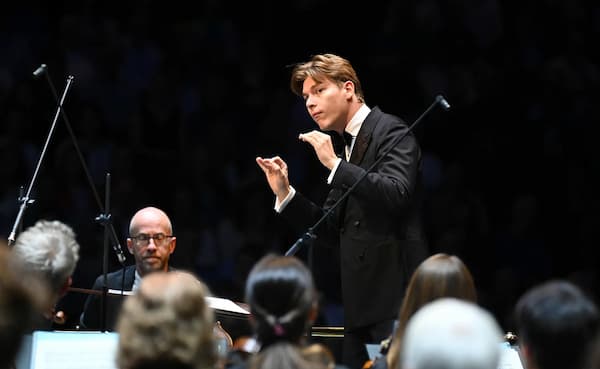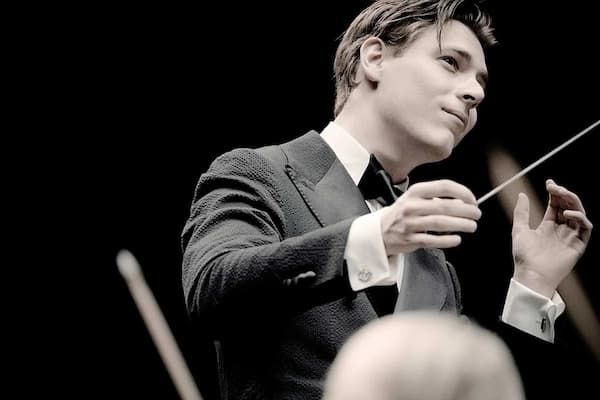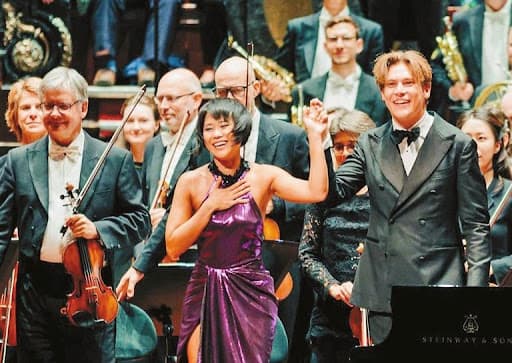Finnish conductor Klaus Mäkelä, born on 17 January 1996 in Helsinki, transcends the podium and captures the essence of every musical phrase with remarkable precision and depth. Known for his dynamic presence and innate musicality, Mäkelä brings an intensity to his performances that is both commanding and deeply engaging. His interpretations are marked by a refined sense of balance and a profound understanding of the music’s emotional core.

Mäkelä’s meticulous attention to detail and his ability to draw out the nuances of an orchestra make him a conductor who connects deeply with both the musicians and the audience. Whether leading large symphonic works or intimate chamber pieces, he consistently creates a transformative musical experience, one that is as intellectually stimulating as it is emotionally resonant. Given such high praise, let us sample some of his most notable recordings.
Sibelius
Klaus Mäkelä Conducts Sibelius’ Symphony No. 1 in E minor, Op. 39
Mäkelä’s Sibelius recordings have received considerable praise for their freshness, sensitivity, and the depth he brings to the symphonic works of his compatriot. His approach to Sibelius is characterised by his ability to combine precision with passion. Seemingly, he seems to have an intrinsic understanding of Sibelius’s emotional and spiritual depth. While still respecting the long structural arc, his phrasing is often fluid, making his Sibelius feel spontaneous.

Mäkelä’s approach to the First Symphony is marked by a keen sense of drama and drive, specifically in the first movement, where the tension between the dark opening theme and the more lyrical material is clearly drawn out. The famous “Andante cantabile” is deeply expressive, while the finale provides a sense of urgency, blending themes of triumph and struggle with great finesse. The Telegraph writes, “his 1st Symphony is radiant and bold, with Mäkelä bringing freshness and vitality to the familiar work.”
Bartók
Klaus Mäkelä Conducts Bartók’s The Miraculous Mandarin, Op. 19
Mäkelä’s Bartók recordings, especially those with the Orchestre de Paris and Oslo Philharmonic, have attracted significant attention for their distinctive interpretations and musical vitality. His engagement with this composer has been praised for “capturing the intricacies and emotional depth of Bartók’s compositions and balancing technical precision with expressive intensity.”
While the New York Times praised Mäkeläs “extraordinary grasp of Bartók’s complex textures,” the Financial Times noted Mäkelä’s “deep understanding of the composer’s fusion of folk music and modernist sensibilities.” To be sure, Mäkelä’s interpretations bring a natural fluency to the music of Bartók, emphasising the clarity of orchestral textures and the delicate balance between drama and lyricism.
Stravinsky

Klaus Mäkelä © Marco Borggreve
Igor Stravinsky: Le sacre du printemps (Orchestre de Paris; Klaus Mäkelä, cond.)
Mäkelä’s interpretations of Stravinsky’s works have been lauded for their precision, rhythmic vitality, and the ability to bring out the emotional complexity in Stravinsky’s music. As a conductor known for his dynamic presence and attention to detail, Mäkelä’s Stravinsky recordings are highly regarded for their modern, vivid interpretations of the composer’s rich and diverse output.
Critics have highlighted Mäkelä’s ability to maintain the dramatic tension in Stravinsky’s works while also exploring their more intimate, delicate moments. His control over the pacing has been particularly noted. Navigating the contrasting sections of Le sacre du printemps, Mäkelä’s ability to modulate the tempo has earned consistent praise for adding emotional depth and excitement to this complex work.
Ravel

Yuja Wang and Klaus Mäkelä
Klaus Mäkelä and Yuja Wang starred in one of the most talked-about romances in classical music. The romance was short-lived, and they are seemingly unable to face each other on stage or elsewhere. In the event, they previously shared the stage as a conductor and soloist in various concerts. Both, of course, are highly regarded in their respective fields, with Mäkelä a rising star in the conducting world and Wang as one of the most celebrated pianists of her generation.
Their musical relationship is marked by a mutual understanding of each other’s musical strengths and styles. Mäkelä’s conducting is precise and energetic but also flexible and communicative. This is complemented by Wang’s expressive approach to performance and her technical brilliance and deep musicality. They certainly brought an infectious energy to their performances, as evident in the recordings of the Ravel Piano Concertos.
The Financial Times reported that “Wang’s dazzling technique and precision are matched by Mäkelä’s surefooted leadership, creating a performance full of vitality and finesse,” while George Hall in The Guardian suggested that “Mäkelä and Wang have an innate understanding of the Ravel concertos, delivering interpretations that are as thrilling as they are musically refined, full of rhythmic vitality and emotional depth.”
For more of the best in classical music, sign up for our E-Newsletter
